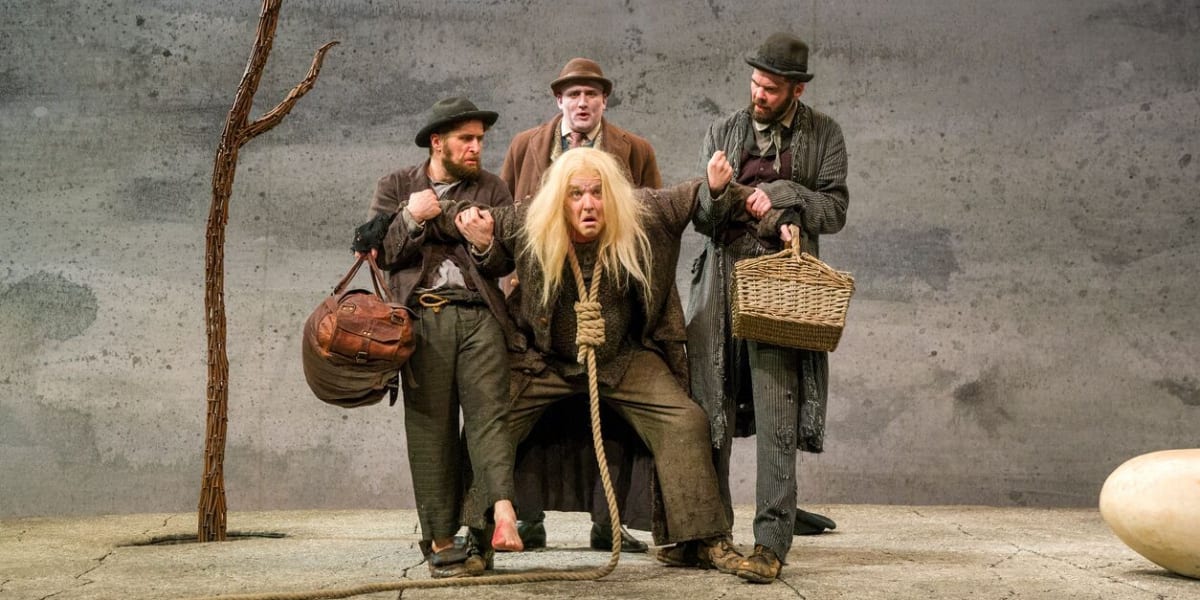Treating the Samuel Beckett’s detailed directions with utmost reverence leaves a director with a limited creative scope. I may go as far as to say, that if you’ve seen one production of Waiting for Godot, you may think you’ve seen them all. Except, that is, for the actual performance of the actors.
Under the direction of The Druid Theatre Company’s acclaimed director, Garry Hynes, this somewhat languid production with her very able Druid Ensemble does nothing unexpected yet everything is to the delight of the audience as she adheres to Beckett’s detailed instructions. That’s something and ironically ties in beautifully with Godot’s infinite themes.
The very thin Vladimir (Marty Rea) and the short Estragon (Aaron Monaghan) wait in a bleak wasteland where there is only one forlorn tree and a large egg-shaped boulder. This Laurel and Hardy twosome are waiting for Godot who never arrives and never will. While waiting they engage in a variety of absurdist discussions and antics to pass the time which are repeated from the previous day and are to be repeated in days to come.
In her otherwise sensitive rendition of Godot, I found the pace and comic exchanges at times to be hindered when actors delivered lines out to the audience rather than to each other. While at times this diminished the characters’ deep and abiding relationship with each other, it did encourage the audience to face their own existential dilemmas and create a fundamental communality.
Both Monaghan’s Estragon and Rea’s Vladimir executed a delicate balance between their pratfalls and their pathos. The stage pictures of them on Francis O’Connor’s evocative set, two silent and motionless humans, are haunting reminders of our own existential loneliness. But this gloom is balanced with humor of companionship. The audience at the performance I attended duly laughed at the couple as they struggled with each other, putting on and taking off Estragon’s shoes, switching three hats in true Marx Brothers tradition. They encounter Pozzo (played with tremendous panache by Rory Nolan), dressed and speaking like a true Protestant landowner with his slave Lucky (in a remarkable performance by Garrett Lombard). Finally, a young boy (Nathan Reid) brings a message from Godot that will keep Gogo and Didi in their non-ending cycle of waiting to go on forever.
When Pozzo drags Lucky in by a rope around his neck and breaks into Gogo and Didi’s unhurried explorations, a purposeful comic exuberance lifts the play. Pozzo commands Lucky to “think.” Mr Lombard’s rapid, passionate and nonsensical outburst becomes a brilliant counterpoint to the repeated, rational questions of existence that plague Estragon and Vladimir. In his act of irrational verbosity, Lucky finds his own unlimited freedom of expression, devoid of any other meaning than that he is full to overflowing with words. At the performance I attended, the audience exploded with a wild and jubilant appreciation for his enormous yet futile effort.
Discussions of the play’s themes have been pursued by academics, philosophers, religious thinkers, excited students, actors and audiences for over 65 years since Waiting for Godot first appeared in French in 1953. What is the meaning of human mortality, of God’s place or even existence, of the Sisyphean absurdity of the lone human being’s never-ending uphill attempt to find the answers then descent into nothingness again? Beckett’s rich, poetic, comic/tragic language never answers any of these questions definitively but as Estragon says: “We always find something, eh Didi, to give us the impression we exist?”

